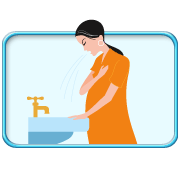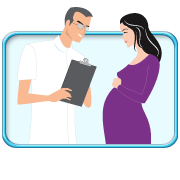

during Pregnancy
During pregnancy, a balanced diet is essential for the development of the foetus. The expectant mother should have well balanced meals. She should also take sufficient quantities at meal times and avoid frequent in-between meals. However, if she happens to feel hungry in between meals, she should take nutritious yet non-cariogenic (not causing tooth decay) snacks such as boiled egg, cheese, milk and some raw vegetables. She should take sufficient quantities to avoid the need for frequent snacking in-between meals. In addition, she should try to refrain from taking acidic foods such as preserved plums, lemons, tangerine skins etc. to prevent the teeth from being eroded by acids, which leads to "tooth sensitivity".
Related topics: Eat appropriately (Leaflet) (PDF)
To maintain good oral hygiene, the expectant mother should brush her teeth in the morning and before bed at night with fluoride toothpaste and use dental floss every day. If she vomits or needs to eat more frequently, she may use fluoride mouthwash to get additional protection against tooth decay. However, she should seek advice from dentist before using it.

Related topics:
Toothbrushing method
Using dental floss
Oral Health for the Expectant Mother (Leaflet) (PDF)
Expectant mother can arrange a pre-pregnancy dental check-up and had all the dental problems treated before she is planning to pregnant. This can avoid comprehensive dental treatment during pregnancy and dentist can provide her with oral health care message during pregnancy.
During pregnancy, expectant mother still needs to have dental check-up. The best timing is 4th to 6th month of pregnancy because the foetus is most stable at this stage. She should inform the dentist that she is pregnant during the dental check-up, so that the dentist can take necessary precautions during dental treatment.
However, if the expectant mother has tooth that really need complicated dental treatment like root canal treatment, extraction of impacted wisdom tooth, etc., the treatment should be arranged to carry out after she has given birth. This could avoid discomfort during lengthy treatment procedures.
Dental clinics have adequate precautions for taking radiographs like putting on lead apron for the patient and using fast speed film, etc., such that the foetus can be safeguarded. Should expectant mother feel worried, she can discuss with her dentist and see if the treatment can be postponed until she has given birth.
